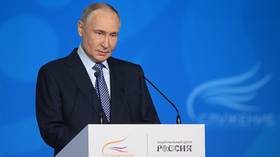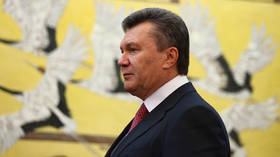New Covid-19 vaccines will be necessary by mid-2022 to combat ‘next generation’ of virus strains, BioNTech CEO says
A new vaccine “tailored” to target probable future mutations of the Covid-19 coronavirus will likely be needed by the middle of 2022, according to the head of BioNTech, the biotechnology company that developed the Pfizer shot.
The German firm’s CEO, Uğur Şahin, told the Financial Times that Covid-19 variants such as the Delta strain were more contagious but could be tackled by booster shots of current vaccines.
However, he added that mutations would emerge that could slip past the body’s vaccine-acquired immune defenses.
“This year, [a different vaccine] is completely unneeded. But by mid next year, it could be a different situation,” Sahin said, adding that “tailored” versions of current vaccines would be needed to specifically target the new strains that emerge.
“This virus will stay, and the virus will further adapt,” he said.
We have no reason to assume that the next-generation virus will be easier to handle for the immune system than the existing generation. This is a continuous evolution, and that evolution has just started.
Vaccination programs will feature two main streams by next year, Sahin predicted, with booster shots for those already inoculated and a continued campaign to get the vaccines to those who have had minimal access to them thus far.
A number of vaccine developers, including BioNTech and US pharma major Pfizer – which helped bring the company’s mRNA vaccine to the market – have been under pressure to share patents and technology to allow wider production of vaccines.
Also on rt.com Pfizer sends Covid vaccine data for kids aged 5-11 to FDA as Fauci hopes to start child vaccinations by end of OctoberWhile Sahin claimed patent-sharing posed no risks to quality control, Pfizer CEO Albert Bourla has repeatedly argued that waiving intellectual property rights would disincentivize innovation. However, critics such as former US Centers for Disease Control and Prevention head Tom Frieden have accused pharma companies of “war-profiteering.”
If they fail to transfer technology, millions of people could die from Covid avoidably, more dangerous variants could emerge, and Pfizer and Moderna will be responsible for these deaths. 27/end of thread but let’s hope not end of story
— Dr. Tom Frieden (@DrTomFrieden) October 2, 2021
Sahin declined to forecast how the Pfizer vaccine would be priced in the future, but told the newspaper that it would still be needed in the coming years.
Meanwhile, a new study suggested that fully vaccinated recipients of the two-shot Pfizer vaccine lose the vaccine-induced antibodies after about six months. In roughly half of all subjects in the study, the antibodies that help block infection against coronavirus variants such as Delta, Beta, and Mu could not be detected six months after the second dose, the non-peer-reviewed study published in bioRxiv claimed.
Noting that antibody levels “drop by nearly 10-fold” in seven months, the study’s authors told Reuters that the findings suggested booster shots administered “around six to seven months” after initial immunization would “likely enhance protection against SARS-CoV-2 and its variants.”
Last month, the US Food and Drug Administration allowed for a single booster dose of the Pfizer-BioNTech vaccine for senior citizens and those at high risk of severe Covid-19. The booster dose will be administered six months after the first series of shots.
Also on rt.com Biden gets Covid-19 booster live on air, says US will have a ‘problem’ until 98% of Americans are vaccinatedIf you like this story, share it with a friend!














